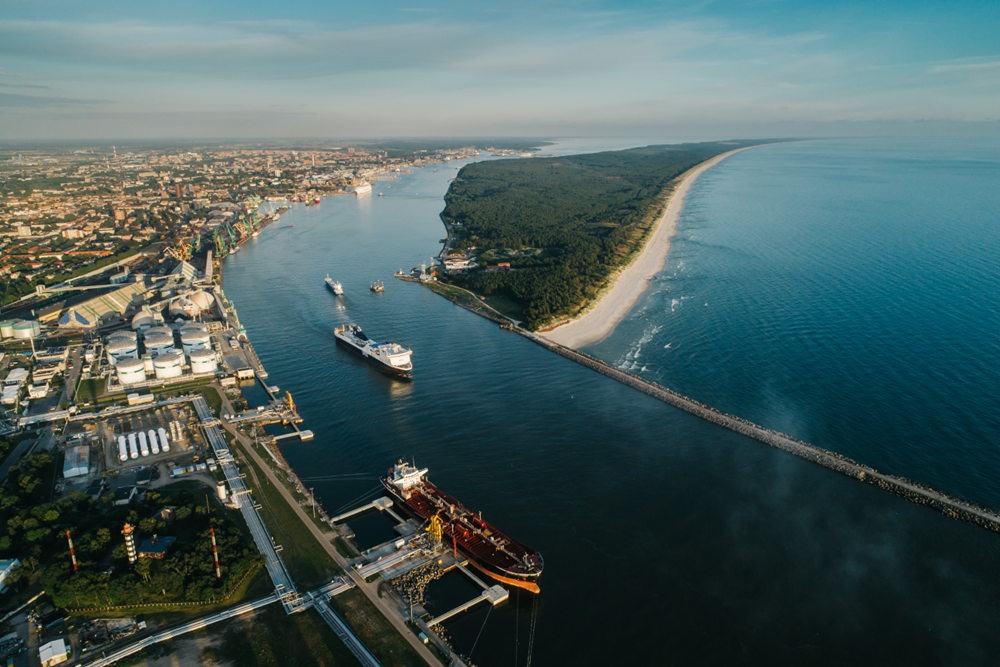Klaipėda Manifesto: Nordic-Baltic Blue Economy Opportunities
The international conference “Klaipėda Manifesto: Nordic-Baltic Blue Economy Opportunities” invites to explore the partnership between the Scandinavian and Baltic regions and provides a networking platform for investors and businesses within the field. Shipping & Offshore Network is one of the organizers and brings along several speakers from Norway. The conference is sponsored by Norway Grants, from our embassy.

The conference, which will take place in Klaipėda on 23-24 September 2021, aims to bring together leading policy-makers, scientists, and businesses to share their knowledge and experience in the blue economy. More than 20 guest speakers will talk about aquaculture, renewable energy, information and communication technology, investment opportunities and the European Green Deal and Blue Economy.
The conference provides a unique interdisciplinary platform for researchers, practitioners, and educators to present and discuss the most recent innovations, trends, and concerns and discuss practical challenges and solutions in the fields of blue economy and blue growth. According to the European Union (EU) Blue Economy Report 2020, maritime industry, transport, port activities, fishing, aquaculture, and coastal tourism account for 4.5 million direct jobs in the EU and generate more than EUR 650 billion in turnover.
“Klaipėda’s academic and business community, as well as partners in the Baltic region, have every opportunity to build top-notch technologies and create high value-added jobs in every sector of the blue economy,” Eglė Songailienė, general manager at Klaipėda ID, said. Klaipėda’s deep maritime traditions and universities cultivating young professionals and creating top-notch technologies allow Klaipėda to enter the ranks of the leading European blue economy cities. The collaboration between Norway and Lithuania is crucial for becoming a competitive player in the global market.
“We are small countries, and we can achieve much more by mobilizing our financial, human resources, competencies, and experience,” Songailienė said. Norwegian companies working in maritime, energy, and seafood certainly consider Klaipėda as a business destination. “I am sure they keep their finger on the pulse of the investment opportunities,” said Norwegian ambassador to Lithuania and Belarus, Ole T. Horpestad.
But there’s more to the collaboration between two countries than just business. The global community will not achieve its sustainability goals unless we utilize the oceans and take better care of them.
“The ocean’s incredible resources are essential in meeting our basic needs and ensuring our welfare, economic success, and livelihoods. Developments in global demography, climate and environment, economy and trade, rising income levels, and new technology are the primary drivers of the rapid expansion of the activity related to the blue economy. It will be impossible to feed the world’s population without making better use of the ocean’s living resources than we do today,” he said. At the same time, he continued, we need immediate help from the ocean to ensure the health of our planet suffering from climate change, biodiversity, and plastic litter.
“We stand at the crossroads. I think this may become the century of the blue economy,” said Ole T. Horpestad.
The conference will also shine a light on the biggest challenges in aquaculture. According to the Lithuanian minister of agriculture Kęstutis Navickas, some of the traditional fish stocks in the Baltic Sea are relatively poor, and the cessation of cod fishing leads to economic losses and a shortage of cod products. In addition, the fish processing industry is underdeveloped in Lithuania. As a result, most fish caught in Lithuania is exported to neighboring countries, leaving local customers without any freshly caught fish to buy. Most of the seafood consumed in Lithuania is imported, and its quality does not always meet the expectations.
Developing technologies, the implementation of innovations, and changing consumer behavior only add up to the challenge. According to Navickas, we need to ensure that the seafood chain has a positive or at least neutral impact on the environment. It is also crucial that everyone has a sufficient supply of nutritious and sustainable food and aquaculture products that meet high safety and quality standards. Navickas hopes that the most sustainable seafood will also become the most affordable one.
Tom O. Kleppestø, general manager at Shipping & Offshore Network, claims that the upcoming conference is an attempt to make Norwegians more aware of Klaipėda. “There are many Lithuanians in Norway, and we have solid ties between the two countries. My goal is to make more people aware of Klaipėda in addition to Vilnius, which many people know for other reasons, and that goes both for business and tourism,” he said. Lithuania has robust information and communication technologies (ICT) and LNG (liquified natural gas) communities and a maritime knowledge hub in Klaipėda, making it exceptionally attractive for Norwegian maritime businesses. Around 350 Norwegian companies present in Lithuania speak of very smooth business collaboration between Norway and Lithuania.
“Klaipėda, being the port of Lithuania, is, the way I see it, a diamond that still needs to be shaped a little bit for Norwegian companies. Klaipėda has a good story to tell. It has to become even more open to the outside world,” he said.
The event is organized by Klaipėda ID and Royal Norwegian Embassy in Vilnius, in partnership with Klaipeda Science and Technology Park, Lithuanian-Norwegian Chamber of Commerce, Norwegian-Lithuanian Chamber of Commerce and Shipping & Offshore Network. This is a hybrid event. You are welcome to join the conference at Smiltynės Jachtklubas, Klaipėda, as well as online - free of charge.
Register here: https://www.accelevents.com/e/klaipeda-manifesto
